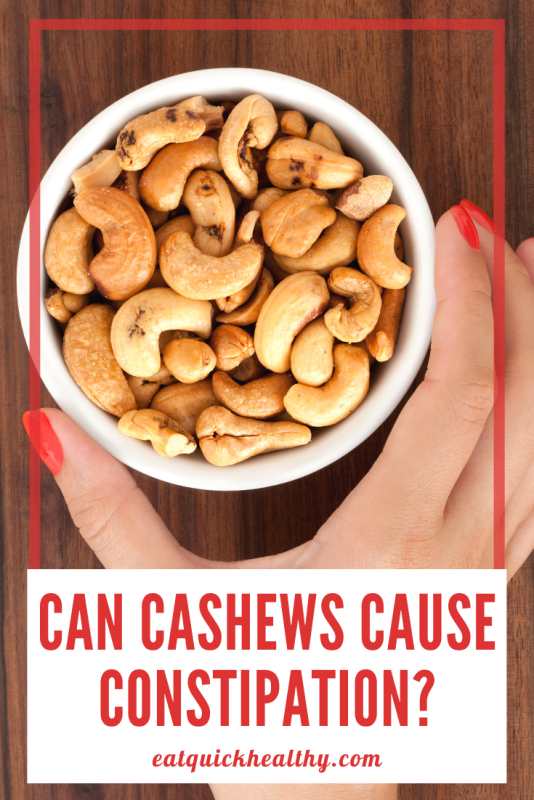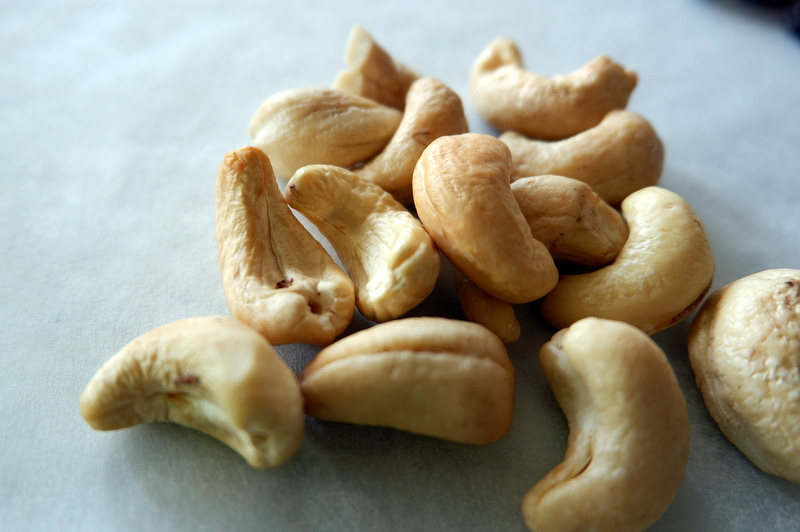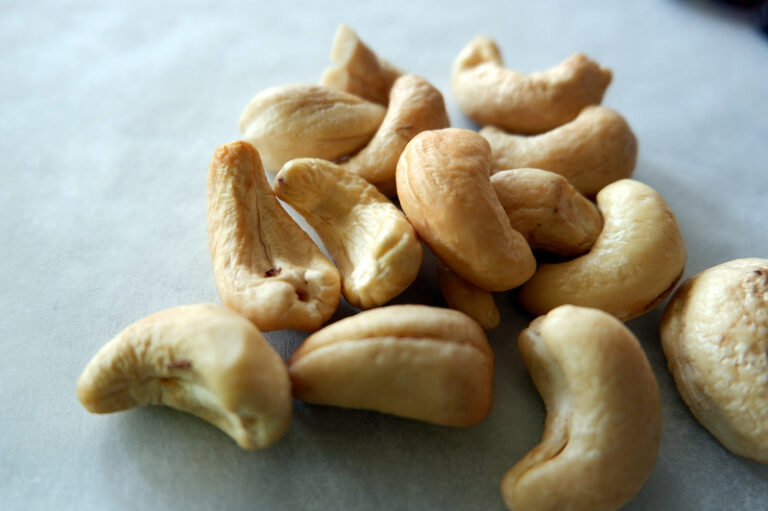Cashews are a delicious and nutrient dense nut. There are a number of potential health benefits when eaten regularly, they are versatile and taste great. But can cashews cause constipation?
Cashews are full of unsaturated fatty acids, protein, vitamins and minerals but they lack a good amount of fiber and this may relate to cashews’ constipation.
Cashews, however, also contain a decent amount of prebiotic which feed the good probiotic bacteria in our stomach for better gut health.
Eating too much of anything is never a good idea, particularly with nuts and more so with cashew nuts as they lack a decent amount of fiber and are high in fat which can cause constipation and bloating when eaten in excess.
If you find yourself experiencing constipation and painful cramps after eating the recommended serving size of cashews, you may want to talk to your doctor about a potential cashew allergy.
If you’ve been wondering do cashews help constipation or do cashews cause constipation, this guide will give you all the information you need to know.

What Are Cashews?
Cashews are actually considered a seed rather than a nut. They grow from cashew trees which originate in Northeastern Brazil. Cashew trees grow a fruit called the cashew apple and at the end of the cashew apple a dark kidney shaped shell encases the cashew seed/nut.
The shell that encases the cashew ‘seed’ is toxic and therefore makes it a hazardous and labor intensive task to remove the shells. Urushiol is the substance found in the cashew shell, causing skin rashes and if ingested can be toxic. Cashew shell oil is used for numerous things including cements, resins, paints, varnishes and more.
Once the cashew shells are removed from the cashew apple, they are dried out and roasted to make shelling easier. Once shelled, the cashews are still not safe for eating as the chemical urushiol can sometimes make its way onto the cashew seed/nut.
The cashews are heated in a low oven for 24 hours, peeled and cleaned. Cashews are then sorted by size. It makes sense once you know this why cashew nuts are so expensive.
Cashews offer a range of nutrients from unsaturated fatty acids, protein, iron, vitamins and minerals. They can help reduce cholesterol, manage blood sugar, maintain healthy bones, skin, hair and more.
Cashews have a rich nutty taste, and a softer texture than other nuts. Cashews can be made into cashew milk, oil, butter and cream. It is a super versatile nut. Cashews are versatile and healthy but eating too many can cause some issues such as weight gain and tummy aches.
Can eating too many cashews cause constipation? Let’s find out.

What Is Cashew Milk?
In the past several years, cashew milk has made its way into the market, with news of its nutritional benefits and versatility, particularly around restrictive diets such as vegan and paleo, becoming recognised.
Cashew milk is a creamy and mild flavored drink made of cashew nuts and water. There is a bit of a debate around whether cashew milk should be called a milk as the natural nutrients are quite different than what is offered in cows milk. Cashew milk purchased from the store, however, is often fortified with the vitamins and minerals found in regular dairy milk.
When cashew milk is made at home it requires no straining unlike other nuts as cashews leave no residue, just a creamy and mild drink. This is because cashews are quite low in fiber compared to other nuts which some people think may cause cashew milk constipation, which we will talk more about below.
When cashew milk is made at home, it is usually more nutrient dense in protein, iron and fat than store bought. This is because store purchased cashew milk is often less than 3% cashew nuts. Store bought cashew milk will usually be fortified with more calcium, vitamin D, etc.
What Is Constipation?
Constipation is a common condition of the digestive system where an individual has a hard stool that is difficult to expel. Constipation is usually caused by the colon absorbing too much water from the food being digested, leaving the waste hard to pass. This can cause painful bowel movements if any bowel movements at all.
There are several causes of constipation including lack of adequate hydration, lack of exercise, low fiber diets, medications, and more. Symptoms caused by constipation include difficultly passing stool, stomach cramps, sweating, bloating, appetite loss and more.
Treatment for constipation includes increasing fluid intake, increasing exercise, increasing fiber intake, medicines, etc. Sometimes constipation can be a sign of more serious illness. If you have concerns you should always consult with your physician.
Can Cashews Cause Constipation?
Cashews may cause constipation and bloating in certain individuals with food sensitivities and digestive issues such as IBS. Research on cashews causing constipation is pretty limited so lets take a look at the facts.
Cashews contain a low amount of fiber, especially when compared with other nuts like almonds. One serving size of cashews contain around 4% of your daily fiber needs where a serving of almonds, for example, will provide you with 11%.
Eating too much of anything is never a good idea, and particularly with cashew nuts. Cashews are high in fat and consuming too many of them can cause bloating and a change in bowel movements.
Many people are allergic to cashews, some are mild and some life threatening. Cashews can cause constipation and stomach upset in people with sensitivities to them. If you are experiencing these issues, particularly after only a serving size, it is best you visit with you physician to ensure you aren’t allergic.
FODMAP recommends individuals with IBS avoid eating cashews and cashew products such as cashew milk as it may cause constipation in these individuals.
Are Cashews Good For Constipation?
Again, the limited studies that have been done on cashews causing constipation makes it difficult to say whether they are good for constipation so let’s take a look at the facts.
Yes, cashews are low in fiber but they are also high in prebiotic. These prebiotic feed the healthy probiotic bacteria found in our gut, creating a healthier environment.
Cashews also contain a high amount of magnesium which is often used to treat constipation.
Does Cashew Milk Cause Constipation?
Cashew milk is unlikely to cause constipation in individuals that do not experience digestive sensitivities.
FODMAP recommends individuals with IBS avoid cashews and cashew products such as cashew milk due to the risk of constipation and stomach cramping.
Cashew milk is high in fats and protein, but it is not so much that it will cause constipation when drinking the recommended serving size per day.
Of course if drank in excess, cashew milk may cause a change in bowel movements as anything in excess can do this.
Conclusion
Cashews are a nutrient rich and tasty nut/seed that many people enjoy snacking on.
Cashews are unlikely to cause constipation in healthy individuals with no existing digestive issues and can be a great addition to your diet, boasting a whole range of health benefits.
If you have IBS or other digestive issues it is probably a good idea to avoid eating cashews as they may cause constipation in these individuals.
If you have been experiencing constipation from eating cashews, you should consult with your physician to ensure you are not allergic.
Find out if cashews are good for weight loss here, what cashew meal is and what you can use it for here or find all our cashew guides here. You can also find out if almond milk causes constipation here.



Comments are closed.